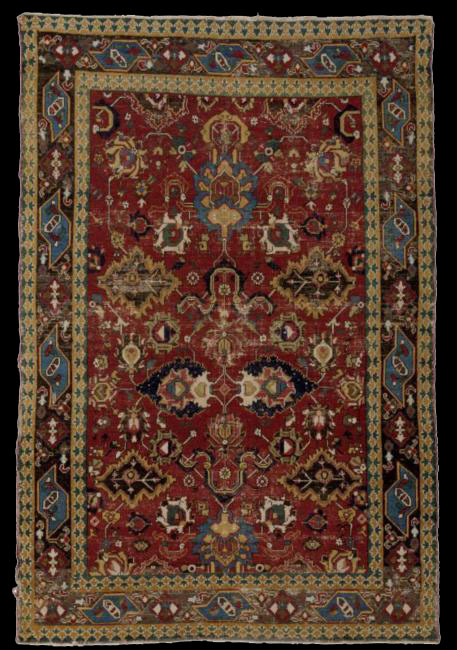Sale: N08103 | Location: New York
Auction Dates: Session 1: Fri, 03 Jun 05 10:15 AM
LOT 49 (of 103)
PROPERTY FROM THE COLLECTION OF ROBERT M. RUBIN
AN AZERBAIJAN RUG, NORTHWEST PERSIA,
18th century
20,000—30,000 USD
Lot Sold. Hammer Price with Buyer's Premium: 27,000 USD
MEASUREMENTS
approximately 6ft. by 4ft. 1in. (1.83 by 1.24m.)
DESCRIPTION
18th century
PROVENANCE
Sotheby's London, 28 April 1993, lot 66.
CATALOGUE NOTE
Since this unusual rug was purchased, the most related example to have
appeared on the market is a gallery carpet from the Rossi collection
(Sotheby's London, 10-12 March 1999, lot 1540) which had a similar
structure, coloring and Isphahan-inspired field design. The field pattern of
the present lot is more closely linked to the 'in-and-out' palmette, vinery
and cloudband rugs of Isphahan, for one example, Sotheby's New York, April
10, 1997, lot 114. The Rossi carpet had a directional pattern of rows of
palmettes and cloudbands, elements found in Isphahan rugs, however
compositionally arranged in the manner of Northwest Persian or Karabagh
carpets such as pl. 78, Kirchheim, H. et al., Orient Stars, London 1993, pp.
144-5. The borders of both of these carpets, while different themselves,
have Turkish characteristics, with the motifs of this rug recalling those in
the field of so-called 'bird' Oushak rugs. Here, however, the border is also
a version of that on other South Caucasian carpets, such as one in the
Textile Museum, see Ellis, Charles Grant, Early Caucasian Rugs, Washington,
D.C. 1975, pl. 9. The reciprocal trefoil guard borders on the present rug
appear as a primary border in carpets such as the Caucasian blossom carpet
in the Textile Museum, see Ellis, op.cit., pl. 24 and a Sa'uj Bulagh carpet,
see Burns, James, Antique Rugs of Kurdistan, Seattle, 2002, pl. 43. |

